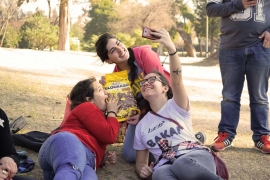We can fall into one extreme of thinking that friendship exists only in the personal encounter, face-to-face, which would mean to scorn or look down at technologies and communication opportunities; or, on the contrary, to believe that the screens reach and overcome the personal bonds with the other. It is necessary to find a meeting point with the network, without being overwhelmed.
Technology and social networks have revolutionized the way we communicate and are transforming culture. Is the way we understand friendship also changing? Networks are ways to connect, and seeing it this way, friendship in essence has not changed; only the dynamic has changed.
Yet the personal encounter is irreplaceable.
When we talk about friendship we talk about a relationship of affection, complicity, respect and mutual trust. When distances do not allow for relationships, social networks bring us closer. First there were letters, now we have WhatsApp. Perhaps the amount of virtual contacts we have daily reduces the space or time for dialogue in person. Perhaps as we look at quantity, we lose quality. However, the problem is not the networks, but the use we make of them. From looking so much at our screens we might even begin to have difficulty looking into someone's eyes, something essential for friendship.
In the Gospel (Jn 15:13) we find the famous phrase "Greater love has no one than this, that he lay down his life for his friends." Give your life, give yourself. Give your time, share daily life, where we find something more than a list of joys, sorrows, triumphs and defeats: we find the other, in his or her uniqueness and complexity. When we open up and share with others, in those moments we cultivate friendship, foster friendship.
Friendship is a precious gift that not even Jesus wanted to deprive himself of: "You are my friends" (Jn 15:14). Don Bosco affirmed the value of healthy ties between his boys, to consider themselves brothers of the same father. The question is: how can we be friends in the era of social networks?
In networks we participate in public conversations, put "like" to some posts, while others we judge negatively. Our opinions are made public openly. This can be a source of conflict and create problems with friends in real life, if misunderstandings occur.
We must ask ourselves: what does our friendship rest on? Are we open to differences? There are people who feel accompanied by their virtual friends, even if they are very alone. These kinds of bonds have their own entity, but we must be careful that the virtual world does not make us live a virtual life.


